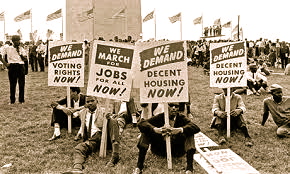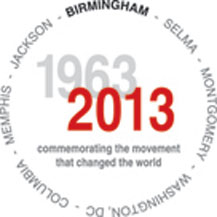Untold History of the March on Washington

50 Years Later, the Untold History of the March on Washington & MLK’s Most Famous Speech
 One week out from the 50th anniversary of the 1963 March on Washington for Jobs and Freedom — and just days away from a major march this Saturday commemorating the event — we spend the hour looking at much of its forgotten history. More than a quarter-million people came to the nation’s capital on August 28, 1963, to protest discrimination, joblessness and economic inequality faced by African Americans. Many now consider the march to be a key turning point in the civil rights movement. We explore the largely untold history behind the march and how Dr. Martin Luther King Jr.’s famous “I Have a Dream” speech, like his own political legacy, remains widely misunderstood. “I think today, the way the speech and the march are understood is wrapped in the flag, and seen as one more example of American genius, when in fact it was a mass, multiracial, dissident act,” says Gary Younge, author of “The Speech: The Story Behind Dr. Martin Luther King Jr.’s Dream.” “The powers that be really did not want this [march] to happen. The march was policed like a military operation.” We also speak to historian William P. Jones, author of “The March on Washington: Jobs, Freedom, and the Forgotten History of Civil Rights.” “It really had a very profound effect on shifting the national conversation, even within the civil rights movement itself, toward a major focus on the connections between racial equality and economic justice,” Jones says.
One week out from the 50th anniversary of the 1963 March on Washington for Jobs and Freedom — and just days away from a major march this Saturday commemorating the event — we spend the hour looking at much of its forgotten history. More than a quarter-million people came to the nation’s capital on August 28, 1963, to protest discrimination, joblessness and economic inequality faced by African Americans. Many now consider the march to be a key turning point in the civil rights movement. We explore the largely untold history behind the march and how Dr. Martin Luther King Jr.’s famous “I Have a Dream” speech, like his own political legacy, remains widely misunderstood. “I think today, the way the speech and the march are understood is wrapped in the flag, and seen as one more example of American genius, when in fact it was a mass, multiracial, dissident act,” says Gary Younge, author of “The Speech: The Story Behind Dr. Martin Luther King Jr.’s Dream.” “The powers that be really did not want this [march] to happen. The march was policed like a military operation.” We also speak to historian William P. Jones, author of “The March on Washington: Jobs, Freedom, and the Forgotten History of Civil Rights.” “It really had a very profound effect on shifting the national conversation, even within the civil rights movement itself, toward a major focus on the connections between racial equality and economic justice,” Jones says.
TRANSCRIPT
This is a rush transcript. Copy may not be in its final form.
JUAN GONZÁLEZ: One week out from the 50th anniversary of the 1963 March on Washington for Jobs and Freedom, and just days away from a major march this Saturday commemorating the event, we spend the hour looking at much of its forgotten and even misunderstood history. More than a quarter-million people came to the nation’s capital on August 28, 1963, to protest discrimination, joblessness and economic inequality faced by African Americans. Many now consider the march to be a key turning point in the civil rights movement. It came in a pivotal year. In June, NAACP field secretary Medgar Evers was gunned down outside his home in Mississippi. Less than a month after the march, four young girls were killed when a bomb exploded at the 16th Street Baptist Church. The next year saw the Civil Rights Act pass, followed by the Voting Rights Act of 1965.
AMY GOODMAN: The most famous speech at the March on Washington for Jobs and Freedom was delivered by the Reverend Dr. Martin Luther King Jr., who had been arrested that April during anti-segregation protests in Alabama and wrote his famous “Letter from a Birmingham Jail.” This is an excerpt from Dr. King’s “I Have a Dream” speech delivered from the steps of the Lincoln Memorial.
REV. DR. MARTIN LUTHER KING JR.: I have a dream that one day this nation will rise up and live out the true meaning of its creed: “We hold these truths to be self-evident, that all men are created equal.”
I have a dream that one day on the red hills of Georgia, sons of former slaves and the sons of former slave owners will be able to sit down together at the table of brotherhood.
AMY GOODMAN: Well, for more on the March on Washington for Jobs and Freedom, 50 years later, we’re joined by two guests. In Madison, Wisconsin, William Jones is a professor at the University of Wisconsin specializing in civil rights and labor history. His new book is just out, The March on Washington: Jobs, Freedom, and the Forgotten History of Civil Rights. His recent piece for Dissent magazine is “The Forgotten [Radical] History of the March on Washington.”
And in Chicago, we’re joined by Gary Younge, an award-winning columnist for The Guardian and The Nation. His book, The Speech: The Story Behind Dr. Martin Luther King Jr.’s Dream, has also just been published.
We welcome you both to Democracy Now! Gary Younge, let’s begin with you in Chicago. What is most important to understand about this speech, that we will hear played certainly as we lead up to this March on Washington? What do we not know about the context of this speech?
GARY YOUNGE: Well, I guess the first thing to know is that it wasn’t as though most Americans at that time were in love with the speech, or even the March on Washington, that the March on Washington polls show was not a popular thing to be doing. Most white Americans certainly believed that the push to civil rights was moving too fast. And in that moment, civil rights as a concept, integration as a concept, was still somewhat controversial, and how America got there was not a foregone conclusion. And I think today the way the speech and the march is understand is wrapped in the flag and seen as one more example of American genius, when in fact it was a mass, multiracial, dissident—dissident act.
And just a couple of examples of things that took place around that time to show that people really—the powers that be really didn’t want this to happen, Kennedy tried to talk them out of the march. The march was policed like a military operation, literally—it was called Operation Steep Hill. And they had boxcars and helicopters ready to go. They stopped all elective surgery in Washington that weekend. They stopped the sale of alcohol, no baseball games, and said that the courts were going to run all night, thinking that there would be a large number of arrests, which there weren’t. But also, quite suddenly, on the day, the sound system had been tampered with by the Justice Department, and they had put a kill switch, because they feared that someone would take to the mic and call for mass insurrection—clearly not really listening to anything the civil rights leaders had been saying over the previous year. And if that were to take place, then the plan was to effect the kill switch, kill the mic and play a record of Mahalia Jackson singing “He’s Got the Whole World in His Hands.”
http://www.democracynow.org/2013/8/21/50_years_later_the_untold_history

